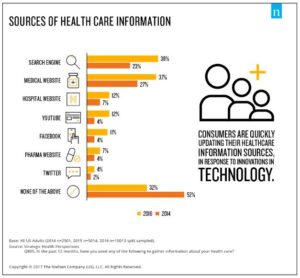Americans are increasingly turning to online platforms to help them understand and manage their health. According to a study conducted by Nielsen, 38% of Americans consulted a search engine for health information in 2016 compared with 23% in 2014. Other digital sources of health information include medical websites, hospital websites, YouTube, Facebook and pharma websites.
Getting more of your potential patients to search for your practice or specialty is a big subject and we have summarized some important points in this post, but have also compiled a more comprehensive White Paper on the subject that you can download at the end of this post.

Know what keywords to target
Since the first place most people go when researching health information is Google, you’ll want to make sure that your website is well optimized for your desired keywords. When deciding which keywords to target, it’s important to keep your potential patients’ intent in mind.
People turn to Google to research a practice before committing to that first appointment. In fact, over 80% of patients conduct online research for providers they’ve been referred to. If they don’t find what they’re looking for, 90% of these people will choose a different provider.
Since there’s no way to know exactly what people are looking for when they go to a provider’s website for the first time, it’s important to have content on your website that covers all bases.
Keyword selection should consider that search queries look different depending on where and how people search. Google’s keyword planner is free for advertisers and provides keyword suggestions, search volume estimates, and competitor information.
Keep it local
Healthcare, by its very nature, is a local service. Even if your practice spans multiple cities or counties, people searching for healthcare services are typically trying to find a provider that’s nearby.
Focusing on local keywords and making sure that your Google business page is up to date are two ways you can reach local patients on search engines.
Social sharing and link building
When another website links to your site, this is called a “backlink.” We recently published a post that goes into detail about the importance of backlinks for search engine optimization.
Conclusion
Healthcare providers need to provide timely, relevant, and search-engine-friendly content or they risk not being part of the patient journey at all. There’s no doubt that SEO is a big subject, but our free downloadable SEO White Paper is a good place to start. Or feel free to schedule a call to talk about your SEO needs at 845-877-0410. We make SEO make sense.


Great material.